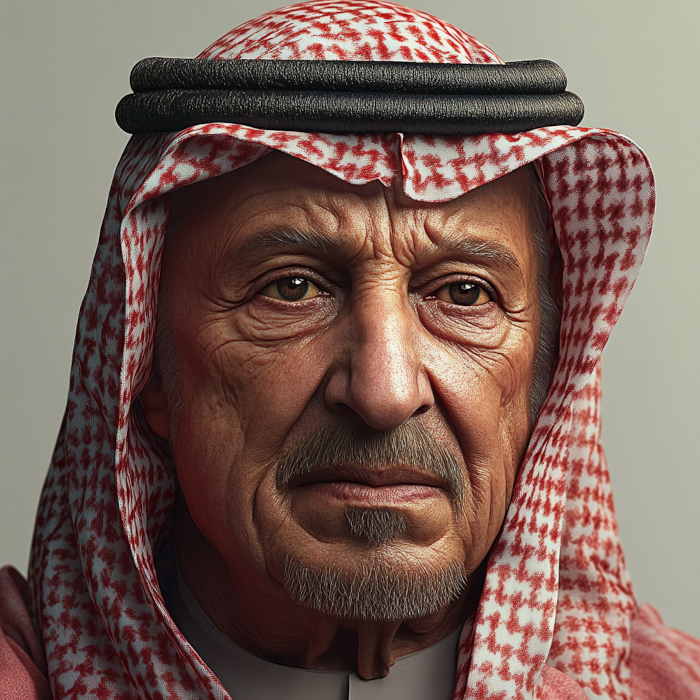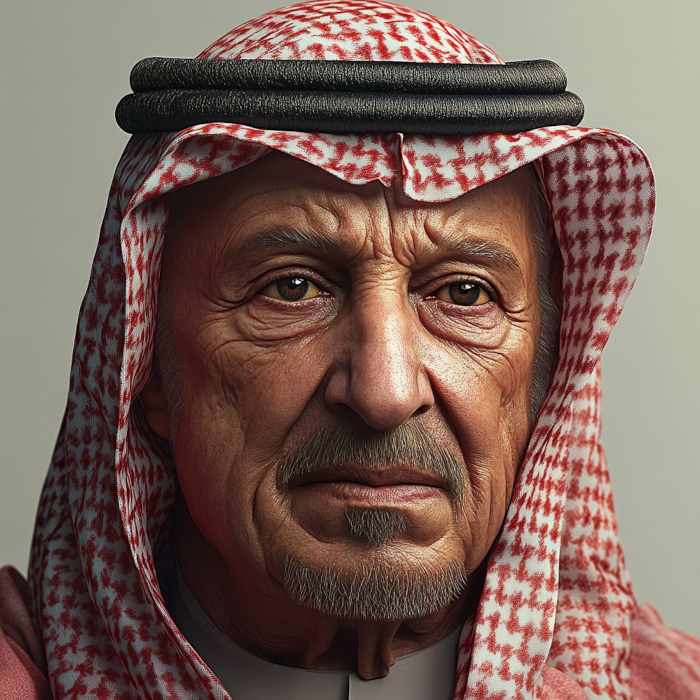


King Salman bin Abdulaziz Al Saud (born 1935) is the King of Saudi Arabia and the Custodian of the Two Holy Mosques. He ascended to the throne in 2015, following the death of his half-brother, King Abdullah. King Salman has overseen a period of significant change in Saudi Arabia, focusing on economic modernization, social reforms, and regional security. He is known for his efforts to diversify the Saudi economy through Vision 2030, which was spearheaded by his son, Crown Prince Mohammed bin Salman. During his reign, King Salman has also played a key role in shaping Saudi Arabia's foreign policy, especially in the Middle East.
Birth and Family Background: King Salman bin Abdulaziz was born on December 31, 1935, in Riyadh, Saudi Arabia. He is the 25th son of King Abdulaziz Al Saud, the founder of modern Saudi Arabia. Salman was raised in the royal palace, and he received a traditional education focused on religious studies, history, and politics. He was taught by prominent religious scholars, which instilled in him a strong understanding of Islam, a foundation for his future role as Custodian of the Two Holy Mosques.
Governor of Riyadh: At the age of 19, Salman began his political career when he was appointed Deputy Governor of Riyadh in 1954. In 1963, he became the Governor of Riyadh, a position he held for nearly 48 years. During his time as governor, Salman transformed Riyadh from a relatively small desert town into a modern metropolis and a key center for commerce and culture in the Arab world. His role as governor earned him a reputation as an effective administrator who worked to modernize the city and attract investment.
Minister of Defense: In 2011, King Abdullah appointed Salman as the Minister of Defense, a role in which he oversaw Saudi Arabia's armed forces. He focused on strengthening the country's defense capabilities and building relationships with key international allies, including the United States. In 2012, following the death of Crown Prince Nayef, Salman was appointed Crown Prince and Deputy Prime Minister, positioning him as the next in line for the throne.
Becoming King (2015): On January 23, 2015, King Salman ascended to the throne following the death of King Abdullah. Upon becoming king, Salman quickly moved to consolidate power and appointed his son, Mohammed bin Salman (MBS), as the Minister of Defense and head of the Council for Economic and Development Affairs. King Salman also restructured the royal succession, appointing Prince Mohammed bin Nayef as Crown Prince and Mohammed bin Salman as Deputy Crown Prince. In 2017, King Salman further consolidated his son's power by appointing Mohammed bin Salman as Crown Prince, effectively making him the next in line to the throne.
Economic Modernization - Vision 2030: One of the most significant aspects of King Salman's reign has been the push for economic diversification through the ambitious Vision 2030 program. Vision 2030, spearheaded by Crown Prince Mohammed bin Salman, aims to reduce Saudi Arabia's dependence on oil and transform the country into a more diverse, modern economy with a focus on sectors such as tourism, entertainment, renewable energy, and technology. Under Vision 2030, the government has pursued large-scale projects, including the development of the futuristic city NEOM and the expansion of the Red Sea tourist areas.
Social Reforms: King Salman's reign has also seen significant social changes in Saudi Arabia, which have been part of the Vision 2030 agenda. These reforms have included:
Women's Rights: In 2018, Saudi Arabia lifted the ban on women driving, a landmark decision that was widely seen as a step forward for women's rights in the kingdom. Other measures aimed at empowering women have included allowing women to attend public events, work in more sectors, and travel abroad without a male guardian's consent.
Entertainment and Cultural Reforms: The government has sought to open up Saudi society by allowing greater entertainment options, such as concerts, cinemas, and sporting events. In 2018, Saudi Arabia reopened its cinemas after a 35-year ban, and the General Entertainment Authority was established to promote cultural activities and entertainment, marking a shift in the traditionally conservative kingdom.
Anti-Corruption Campaign: In 2017, King Salman and Crown Prince Mohammed bin Salman launched a high-profile anti-corruption crackdown, which led to the arrest of numerous princes, businessmen, and high-ranking officials. Many of those detained were held at the Ritz-Carlton Hotel in Riyadh, and some were forced to return assets and wealth to the state in exchange for their release. The crackdown was presented as part of a broader effort to fight corruption, but critics argued that it was also a move to consolidate power and eliminate potential rivals.
Middle East Relations and Regional Security: King Salman's foreign policy has been characterized by a more assertive and interventionist approach, particularly in the Middle East. Under his leadership, Saudi Arabia has taken steps to counter the influence of its regional rival, Iran. This has included forming coalitions with other Gulf and Sunni-majority countries to push back against Iran's influence in Syria, Yemen, Iraq, and Lebanon.
Yemen Conflict: One of the key foreign policy actions taken during King Salman's reign was the Saudi-led intervention in Yemen in 2015. The intervention, known as Operation Decisive Storm, was aimed at restoring the government of President Abdrabbuh Mansur Hadi and defeating the Houthi rebels, who were perceived as being backed by Iran. The war in Yemen has resulted in a humanitarian crisis, with thousands of civilians killed and millions more displaced. Saudi Arabia's role in the conflict has faced heavy international criticism for the humanitarian toll and the use of airstrikes that have resulted in significant civilian casualties.
Qatar Diplomatic Crisis: In 2017, Saudi Arabia, along with the United Arab Emirates (UAE), Bahrain, and Egypt, imposed a diplomatic and economic blockade on Qatar, accusing it of supporting terrorism and maintaining close ties with Iran. The blockade led to a rift within the Gulf Cooperation Council (GCC). The crisis lasted for more than three years before an agreement was reached in 2021 to restore diplomatic ties, with Saudi Arabia reopening its borders to Qatar.
Relations with the United States: King Salman maintained a strategic partnership with the United States, though the relationship faced some challenges during his reign. In 2017, U.S. President Donald Trump made his first official foreign visit to Riyadh, signaling a strong relationship between the two nations. Saudi Arabia and the U.S. share common interests in countering terrorism and containing Iranian influence in the region. However, relations were tested after the murder of journalist Jamal Khashoggi in 2018. Khashoggi, a critic of the Saudi government, was killed inside the Saudi consulate in Istanbul, leading to international outcry and increased scrutiny of Saudi Arabia's human rights record. While King Salman denied any involvement in the murder, the incident strained Saudi Arabia's relations with Western countries.
Normalization of Ties with Israel: Under King Salman's reign, Saudi Arabia has made moves towards normalizing relations with Israel. Although Saudi Arabia has not formally recognized Israel, the kingdom gave tacit support to the Abraham Accords, which saw the UAE, Bahrain, Morocco, and Sudan establish diplomatic ties with Israel. There have been indications that Saudi Arabia might also consider normalization in the future, as part of efforts to counter regional threats, including Iran.
Health Issues: King Salman has faced several health challenges in recent years, including reports of Alzheimer’s disease and other age-related health concerns. In 2020, he underwent gallbladder surgery, and in 2022, he underwent a medical procedure related to his colon. Due to his health, much of the day-to-day running of the government has been handled by Crown Prince Mohammed bin Salman, who has effectively been seen as the de facto ruler of the country.
Crown Prince Mohammed bin Salman: Mohammed bin Salman, commonly known as MBS, has emerged as the most powerful figure in Saudi Arabia during King Salman’s reign. As Crown Prince and Deputy Prime Minister, MBS has overseen the implementation of Vision 2030 and spearheaded social reforms and economic diversification initiatives. He has also been a driving force behind Saudi Arabia's assertive foreign policy. The appointment of MBS as Crown Prince marked a generational shift in Saudi leadership, as he represents a younger, more dynamic approach to governing the kingdom.
Modernization and Reforms: King Salman’s reign has been marked by significant modernization efforts aimed at transforming Saudi Arabia from an oil-dependent economy into a more diversified, dynamic nation. Under his leadership, the kingdom has implemented far-reaching economic and social reforms, including measures to empower women and open up the entertainment sector. The Vision 2030 initiative, despite facing challenges, has set a new direction for the country’s future.
Consolidation of Power and Controversies: King Salman, along with Crown Prince Mohammed bin Salman, has worked to consolidate power within the ruling family, reducing the influence of other branches of the Al Saud family. The anti-corruption campaign and changes to the line of succession were seen as efforts to centralize control. While these moves have brought stability to Saudi governance, they have also drawn criticism for suppressing dissent and sidelining rivals.
Foreign Policy and Regional Influence: King Salman has taken an assertive stance in regional affairs, seeking to counter Iran's influence in the Middle East and strengthen Saudi Arabia's role as a leading regional power. The intervention in Yemen and the diplomatic crisis with Qatar highlighted Saudi Arabia's determination to assert its influence, but they also brought considerable international scrutiny and criticism. King Salman's foreign policy initiatives have aimed to position Saudi Arabia as a central player in regional security, but they have come with significant challenges, particularly in terms of human rights and humanitarian impact.
Challenges and Reforms Amid Controversy: King Salman's reign has also faced significant challenges, including international criticism over human rights issues, such as the murder of Jamal Khashoggi and the treatment of women activists. While the kingdom has taken steps to improve women's rights and social freedoms, these efforts have often been overshadowed by concerns about freedom of speech, political repression, and the handling of dissent.
King Salman bin Abdulaziz Al Saud has presided over a period of significant change in Saudi Arabia, characterized by efforts to modernize the economy, reform society, and assert the kingdom's influence in regional and global affairs. Under his leadership, the ambitious Vision 2030 initiative was launched, spearheaded by Crown Prince Mohammed bin Salman, with the goal of reducing Saudi Arabia's dependence on oil and transforming the country into a diversified, vibrant economy. King Salman has overseen important social reforms, including those related to women's rights, while also facing controversies and international scrutiny over human rights issues.
King Salman's leadership style, marked by pragmatism and a willingness to embrace change while maintaining the kingdom's traditional values, has positioned Saudi Arabia as a key player in the Middle East and the broader global community. His legacy will likely be defined by the modernization efforts and structural changes that have set the country on a new path, as well as the centralization of power and challenges associated with regional conflicts and human rights issues. As he continues to reign, much of the focus has shifted to Crown Prince Mohammed bin Salman, who has become the driving force behind the kingdom’s reforms and future direction.

We use cookies
We use cookies and other tracking technologies to improve your browsing experience on our website, to show you personalized content and targeted ads, to analyze our website traffic, and to understand where our visitors are coming from. Privacy Policy.